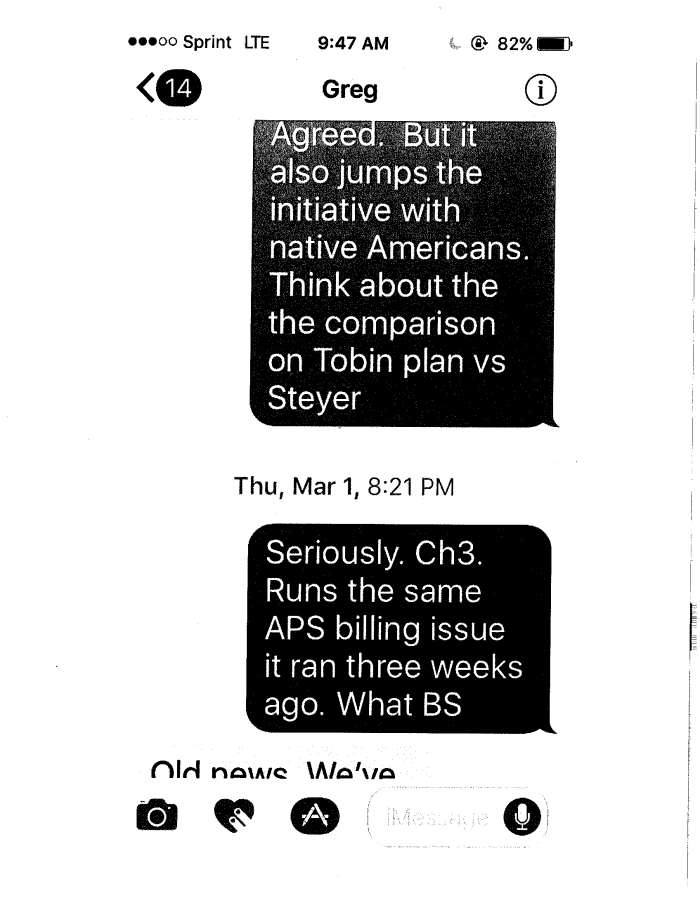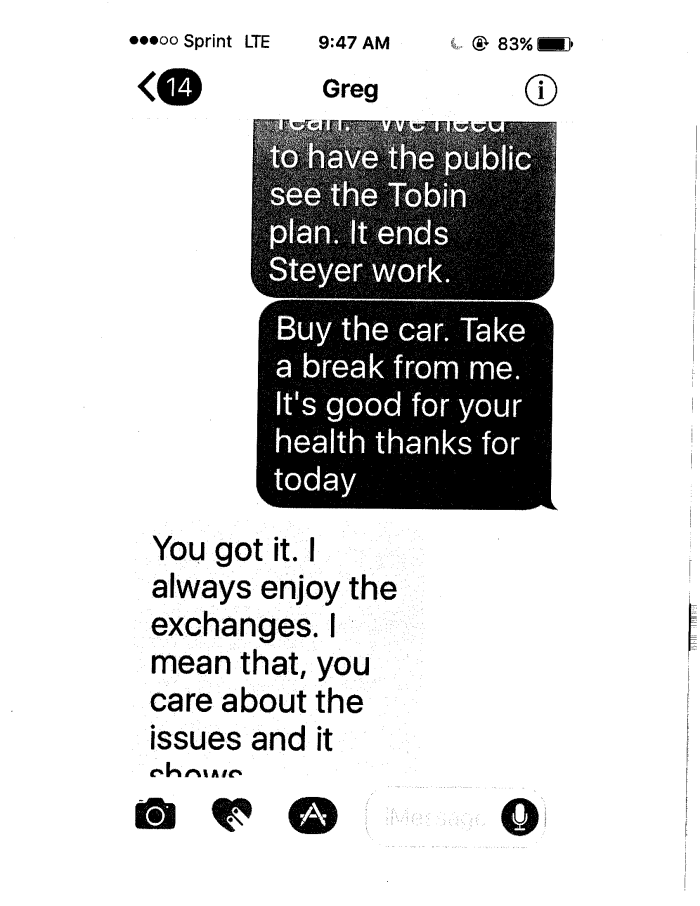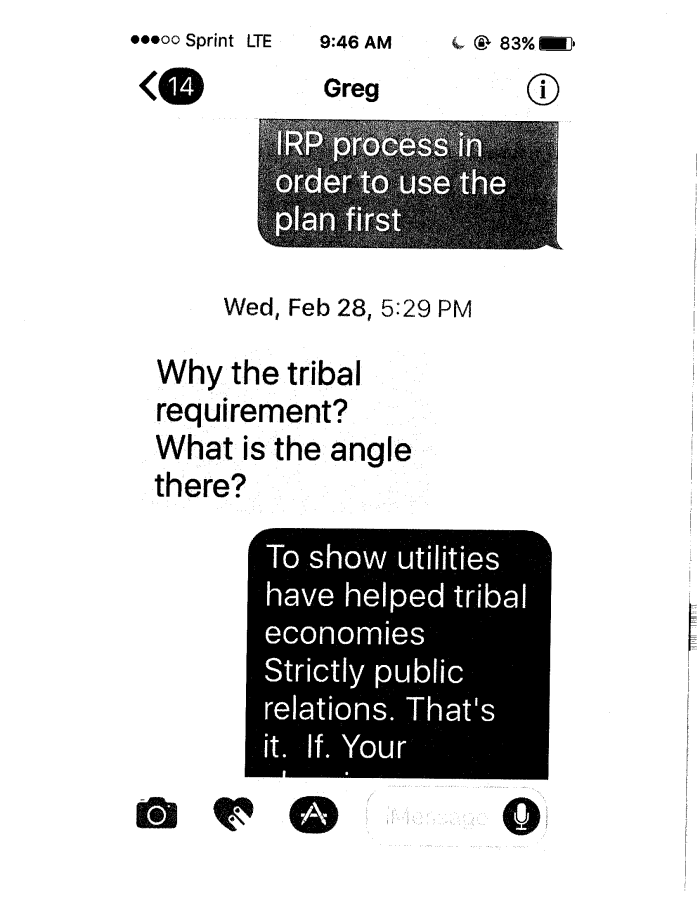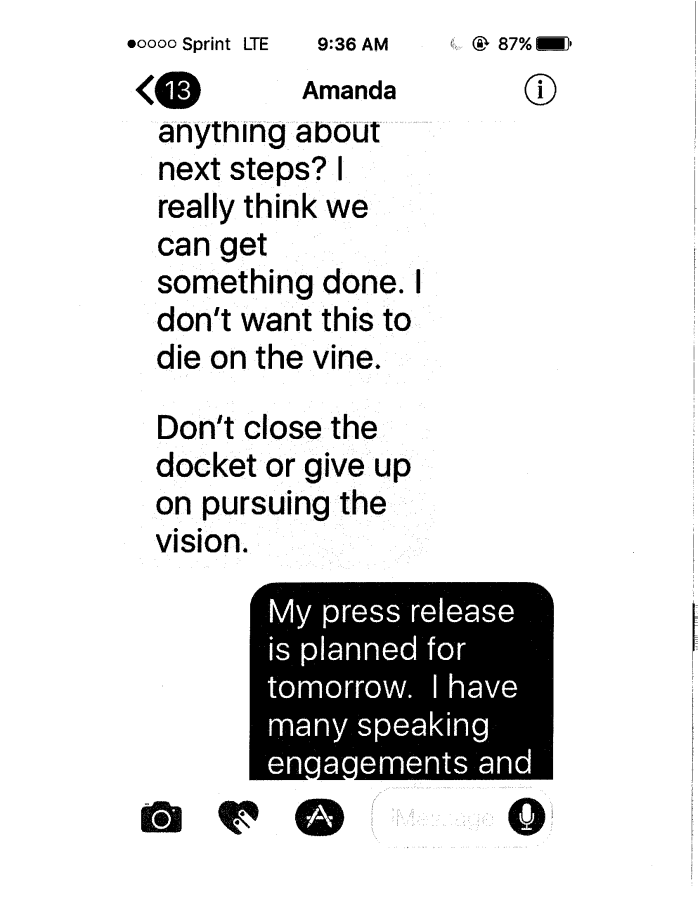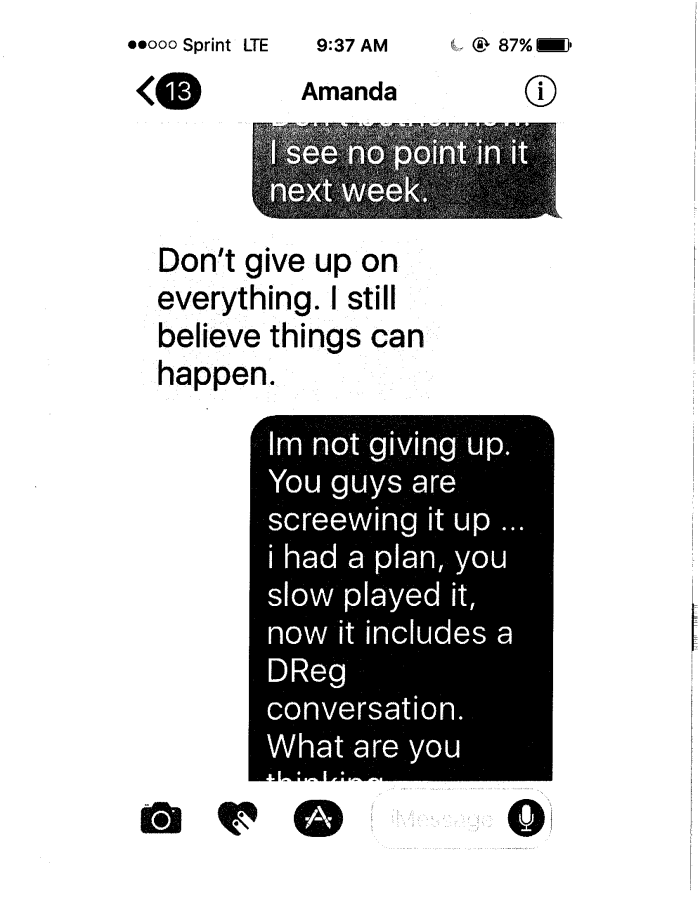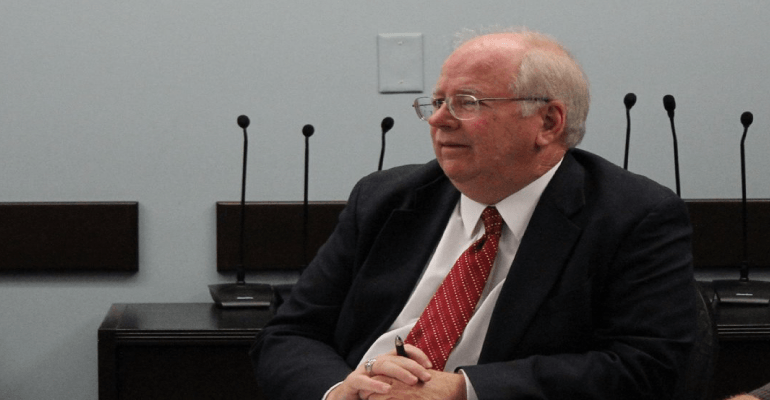
Earlier this month, Arizona Corporation Commissioner Andy Tobin was called out for using public resources for electioneering and now his texts with associates of an Arizona public utility service provider have increased calls for increased scrutiny of his actions.
According to an the Energy and Policy Institute, an organization, with ties to California billionaire Tom Steyer:
Tobin exchanged text messages throughout 2018 with lobbyists from Arizona Public Service (APS), often to complain about negative media coverage of APS’ rate increase requests before the Commission.
On one occasion, Tobin asked an APS lobbyist whether the utility had a “public information strategy planned” to combat negative media coverage of a rate increase request while the case was still pending before Tobin and the Arizona Corporation Commission (ACC).
Related articles:
Tobin, Legislator’s Trade Trip To Mexico Raise Questions About Conflicts
Tobin Claims Media Intimidation In Arizona Water Case
Proposition 127: A Look Behind The Propaganda
Navajo Nation President Has “Grave Concerns” About Prop 127
Distributed Energy Resource Alliance Opposes Proposition 127
In another exchange, Tobin asked an APS lobbyist to review draft language of a policy that would require APS to develop renewable energy assets on tribal lands in an effort to provide economic development to Navajo and Hopi communities. When the lobbyist sounded skeptical, Tobin tried to sell the idea as “strictly public relations.” The lobbyist said APS still would not support the idea; Tobin never adopted it.
The Energy and Policy Institute obtained the text messages between Tobin and the two lobbyists, Greg Bernosky and Amanda Ho, from a Public Records Act request of the Arizona Corporation Commission.
A chronological manifest of the messages, compiled by EPI, is here. EPI also requested text messages between the lobbyists and Commissioners Boyd Dunn, Tom Forese (here), Justin Olson (here), and Bob Burns. Messages between Olson’s policy advisor Ryan McCarthy and the lobbyists are here. The ACC said that it had no text messages between Commissioner Dunn and the lobbyists. It has not yet responded to the request for text messages between Burns and the APS lobbyists.
The ACC, which is supposed to regulate APS in the public’s interest, has been embattled by scandals for the past four years, ever since two non-profit “dark money” organizations spent $3 million on the ACC elections in 2014. APS never confirmed nor denied being the source of that money, but during the 2016 ACC elections, APS’ parent company Pinnacle West set up a PAC, called “AZ Coalition for Reliable Electricity,” which spent $4.2 million of the utility’s money on independent expenditures to elect APS’ favored candidates, including Tobin.
On three occasions, Tobin sent messages to the APS lobbyists complaining about negative media coverage of APS’ rate increases, once in the midst of a rate case hearing.
From September 5 to the 7, the ACC heard testimony for a case in which APS is asking for permission to increase the money it collects from customers by $67 million to pay for pollution control equipment it installed to extend the lifetime of a coal-burning power plant, the Four Corners Generating Station. If approved by the ACC, the plan would increase bills by $3 per month per customer.
On the evening of the second day of the hearings, September 6, Tobin texted APS lobbyist Amanda Ho about a radio news story he heard about the case.
“Have you heard the 550am news report on APS rate hike??” Tobin asked in the text message.
“No. Is it like the Randazzo article?” Ho responded.
The “Randazzo article” which Ho referenced was an article by reporter Ryan Randazzo which the Arizona Republic had published that morning.
“There [sic] saying APS is trying to get its second rate hike this year. $3 more per month,” Tobin wrote.
“Gotcha. That’s the same as the randazzo article,” Ho responded.
“Is there a public information strategy planned??” Tobin wrote back. There is no record indicating that Ho responded.
Commissioners are barred from discussing the “substantive merits” of a case with any of the parties once a hearing date has been determined in a set of rules known as “ex parte.” If a utility, for example, wants to discuss a rate increase request with a Commissioner, it must do so in an official forum so that other parties have a chance to hear the arguments and respond.
It’s not clear whether discussing media coverage of an open case with one of its parties, or asking a party if it has a plan to influence media coverage, would violate the ex-parte rule, but the conversation would seem to contradict its spirit. The Arizona Administrative Code says the purpose of the ex-parte rule is “to assist the members of the Arizona Corporation Commission and its employees in avoiding the possibility of prejudice, real or apparent, to the public interest in proceedings before the Commission.”
Tobin also texted the lobbyists about media coverage of a separate APS rate increase that the ACC approved in 2017, and a subsequent challenge to it.
In January, Phoenix activist Stacey Champion submitted a petition signed by 400 fellow APS customers to the ACC arguing that APS had incorrectly advertised that the 2017 rate increase, approved by the ACC, would raise the average customer’s monthly bill by 4.5 percent. Champion and her expert witness claimed that customers were instead experiencing increases of three times the advertised amount.
When the ACC heard the case in September, the Arizona Republic reported that Tobin appeared critical of the rate increase during the hearing.
“Tobin participated in the hearings and seemed frustrated with the utility after listening to APS’ explanation regarding how adjustors didn’t actually get reduced all at once, and how the average 4.5 percent was calculated,” Ryan Randazzo reported for The Republic.
But in private text messages with APS lobbyists earlier in the year, Tobin was dismissive of media reports that questioned APS’ rate increase in the way that Champion’s case does.
Tobin sent a text message to APS lobbyist Greg Bernosky on January 1 with a link to a column from the AZ Republic’s Laurie Roberts, a frequent critic of APS and the Commission. Roberts’ column included the story of a customer who said her bill was 154 percent higher in 2017 than the same month the previous year, rather than the 4.5 percent average increase promised by APS and approved by the Commission. Roberts also foreshadowed Champion’s challenge. “A petition signed by 25 ratepayers could force a reconsideration. Stay tuned to see if a petition is filed and if the commission comes up with some excuse to declare it invalid,” Roberts wrote.
“Happy NY. Gets old be accused of being bought and paid for … Sheeeesh,” Tobin wrote in his text message to Bernosky about the article.
“Happy New Year. I think one of my resolutions may be to start referring to that paper as the ‘local tabloid’” Bernosky replied.
Tobin wrote to Bernosky that he would be “curious about the ratepayer she is sourcing to be honest.”
“There is always one more case you can find where you can twist facts into her narrative,” Bernosky replied.
“Agreed,” Tobin said.
Champion filed her petition with the ACC two days after that text message exchange.
The same dynamic repeated in March, when Tobin texted Bernosky: “Seriously. Ch3 Runs the same APS billing issue it ran three weeks ago. What BS”
Bernosky responded to the message about the Channel 3 story, which covered customers’ confusion about the new rate increase: “Old news. We’ve really got some good stuff out there, I’ll send you a few good TV/radio spots we’ve had recently.”
“No worries. It’s just bs greg. This bill report is exactly the same as three weeks ago. And I rarely watch tv. So for me to see it makes it obvious and intentional” Tobin responded.
“It is,” Bernosky said. “And it will likely get worse unfortunately.”
The January and March text messages would not constitute an ex-parte violation in Champion’s complaint, since they occurred before a hearing date was set in the proceeding, but they raise the question of whether Tobin’s conversations with APS lobbyists could have precluded him from considering the case before him with an open mind about the evidence presented. The ACC is expected to rule on Champion’s case in December or later.
Tobin met with APS lobbyist Bernosky for frequent drinks
Bernosky was APS’ chief point of contact for the ACC from January through the end of March 2018, after which point Ho took over the role, according to an email Bernosky sent to the commissioners.
Bernosky heaped praise on Tobin in the messages.
In one exchange in February, Bernosky told Tobin: “I always enjoy the exchanges. I mean that, you care about the issues and it shows.”
Tobin responded: “Thanks for making me feel like I can ask questions and learn without making me look or feel stupid.”
At times, Tobin seemed to want to impress Bernosky. He boasted of a nickname he coined for APS’ Palo Verde nuclear plant during a television interview.
“Got lots of calls after my trip and especially tonight’s Horizon. Guess I called Palo Verde the ‘Diamond in the Desert’. Maybe that sticks,” Tobin texted to Bernosky after the show.
“I heard you did a great job but haven’t seen/isn’t on their site yet. I hope it does stick, great label you gave it,” Bernosky responded. “I’m gonna have our media folks track it down today. Wasn’t on their site. Good for you for doing the show.”
Tobin and Bernosky met for drinks on a number of occasions, according to the messages, including at Bernosky’s request at the St. Francis restaurant in Phoenix on January 4.
Tobin then asked Bernosky to meet on a Sunday evening while the two were at a meeting of the National Association of Regulated Utility Commissioners in Washington, D.C. on February 10. Bernosky responded that he was eating dinner with the director of Arizona’s Residential Utility Consumer Office, the office charged with defending consumers against rate hikes, but that he would meet Tobin afterward at a nearby bar.
On the next afternoon, Bernosky texted Tobin to ask if he and “Barbara” – likely Barbara Lockwood, his boss and APS’ Vice President of Regulation who also was in D.C. for the meeting – “could grab some time with you late tonight.” They met at Joe’s Stone Crab after Tobin finished a meeting with Marc Spitzer, a former ACC commissioner who has represented APS as a lawyer for the D.C.-based firm Steptoe & Johnson.
Those meetings, as well as phone calls between Bernosky and Tobin on Jan. 3 and Jan. 30, do not appear on the public calendar Tobin has disclosed as required by the ACC’s Code of Ethics. Another drink with Bernosky at St. Francis in Phoenix, this time on March 5, does appear on Tobin’s calendar, though the appointment is listed only as “Greg.” In other previously released emails, Ho referred on April 9 to seeing Tobin and his policy advisor, another meeting which does not appear in Tobin’s calendar.
The text messages showed friction at times, too. Tobin pressed Bernosky over APS’ originating and lobbying for a piece of legislation, sponsored by Rep. Vince Leach, which would require utilities to provide dedicated funding to the ACC so that the Commission could work through rate cases faster, according to Bernosky’s text messages. Tobin seemed irked with Bernosky, saying that the Commission didn’t need the extra resources and wondering whether APS was pushing the bill on behalf of others at the Commission with an agenda for more funding.
Tobin wanted, but didn’t always receive, APS’ support for Energy Modernization Plan
The text messages show Tobin keeping APS in the loop about the development of his Energy Modernization Plan, which has been at the center of Tobin’s agenda since he announced it in January. The plan would set a goal – though not a binding one – for Arizona’s utilities to power their operations with 80% carbon-free energy by 2050, including nuclear power along with renewable sources. Tobin’s plan also would require new investments in battery storage, an escalating percentage of renewable energy during peak hours of the day, and energy generation from biomass.
APS has publicly supported Tobin’s plan as a better alternative to Proposition 127, the more aggressive renewable energy ballot initiative which the utility opposes.
But Tobin has struggled to secure the necessary two votes from his fellow commissioners to move his plan forward, and his text messages with APS about the effort alternate between cajoling the monopoly to offer more support, and frustration with it for not helping to advance his plan faster.
On Feb. 28, Tobin asks Bernosky: “Can you get me a hi [sic] low for Native American renewable energy goal If I need it. I think I will since commission slowed me down.”
“It adds advocates if it’s not driving others away,” Tobin says before sending Bernosky formal draft language and asking if he had “thoughts to make this fit ???”
The language would have required APS to procure 300 megawatts, and Tucson Electric Power to procure 200 megawatts, of new renewable resources from Hopi or Navajo lands. Those renewable energy investments could help communities make an economic transition as coal plants such as the Navajo Generating Station and later the Four Corners Generating Station shut down. Three Navajo community organizations, Diné CARE, Tó Nizhóni Áni and DinéHózhó, have advocated for such a policy on multiple occasions throughout 2018.
APS spokespeople have pointed at the closure of coal plants as a reason that Navajo communities should reject 127. But when Tobin proposed that APS build new renewable energy assets in Navajo and Hopi tribal communities, Bernosky demurred.
“Why the tribal requirement? What is the angle there?” Bernosky asked.
“To show utilities have helped tribal economies,” Tobin responds. “Strictly public relations. That’s it. If. Your planning on building on the transmission lines. It could sell better and help get tribes on board. Rural piece.”
Bernosky texted Tobin on Mar. 1 to say that APS could not abide the idea: “I’ve had some convos on this today, we are not comfortable with a requirement like this. Not that we don’t support for tribal interests, but this seems to add complexity that isn’t necessary.”
Tobin responded by offering that the tribal requirement “also jumps the initiative with native Americans. Think about the comparison on Tobin plan vs Steyer.” Steyer is a reference to Tom Steyer, the major funder of Prop 127.
Bernosky did not text back a response, and the requirement never made it into Tobin’s plan. That didn’t stop Tobin from tweeting earlier this month that his plan is better for Native communities than Prop 127.
In another text message on Feb. 28, Tobin told Bernosky that “We need to have the public see the Tobin plan. It ends Steyer work.”
Tobin grew frustrated with APS’ lack of support for Energy Modernization Plan
By the summer, Tobin had become exasperated with APS for its lack of support for his plan. At one point in July, Tobin told APS’ Amanda Ho that he was ready to give up on the effort, and that he would issue a press release the next day announcing his intentions.
“I heard a rumor, and if it’s true, don’t do it! Call me when you have a chance,” Ho texted Tobin on July 19.
“I’m moving on to Block Chain stuff,” Tobin responded. Tired of 2.5 years of this. If you can’t get a vote to go to rules. Your [sic] not likely getting support.”
“I get your frustration and hear you,” Ho replied. “Can you hold off on announcing anything about next steps? I really think we can get something done. I don’t want this to die on the vine. Don’t close the docket or give up on pursuing the vision,”
Tobin seemed resolute: “My press release is planned for tomorrow. I have many speaking engagements and don’t want to press my plan with these fine groups and people when I know it’s a dead plan.”
Ho asked to talk on the phone. Tobin never sent out the press release or quit on his plan.
A week later, after Commissioner Burns requested that the Energy Modernization Plan include a conversation about introducing competition to Arizona to break up APS’ monopoly, Tobin blamed APS for the plan’s stalling.
“I see Burns wants Dereg now in the Energy Plan. Is this what you wanted.” Tobin asked Ho.
“I can confidently say it’s the opposite of what we want,” she responds.
“You guys are screwing it up,” Tobin answered. “I had a plan, you guys slow played it, now it includes a dereg conversation. What are you thinking.”
“I hear your frustration. Ill [sic] move the message up the chain,” Ho said.
The text messages echo concerns that Commissioner Burns raised when Tobin introduced the plan in January about Tobin’s willingness to act independently of APS’ interests.
“If we want to move forward with a serious and significant clean energy plan, we are going to have to make decisions that may run contrary to the interests of APS,” Burns said. “It’s time this Commission showed a willingness to do that.”
“Commissioner Tobin himself has led the efforts to keep the ACC as a group that is supportive of APS’ position,” Burns added at the time.

